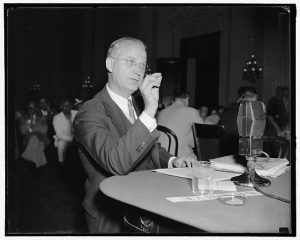
The House Un-American Activities Committee (HUAC) went through a number of different phases in its long and controversial history. Having enjoyed a brief beginning in 1934-35, HUAC was reborn as the House Special Committee on Un-American Activities in 1938. Known as the Dies Committee after its chairman, Rep. Martin Dies, Jr. (D-TX), the committee made headlines as it investigated communist, Nazi, fascist and Japanese activities deemed subversive. The Dies Committee, and its chairman, placed a particular focus on pursuing communist and other radical left activities, examining such bodies as the Federal Theater Project and seeking to draw links between the Roosevelt Administration and New Deal and the Communist Party (CPUSA). In the words of historian Richard Gid Powers:
The information the Committee collected in the thirties still forms the foundation for much of what we know today about communism in that decade. But the Committee really was not all that interested in simply collecting and publishing facts on the Communist Party and its activities. It was far more intent on using that information as ammunition for red-smearing attacks on the administration, attacks on the union movement, and attacks on unpopular opinions and associations. (Powers, Not Without Honor, 128)
This legacy would be embodied in the final act of the Dies Committee, the release of a publication that would provide much of the raw data used by self-appointed “red hunters” to determine candidates for blacklisting in the 1950s.
J.B. Matthews and Appendix IX
The individual most directly responsible for collecting the information used by the Dies Committee was its chief investigator, Dr. Joseph B. (J.B.) Matthews. A former Methodist missionary who held a divinity degree, Matthews turned to socialism in the early 1930s. He soon became what was known as a “fellow traveler”, a non-communist who agreed with the communists on almost every issue and participated in numerous communist-led organizations. He had a falling out with the communists after a CPUSA-led strike at Consumers’ Research, where Matthews was a top official. During the course of this strike, Matthews was publicly vilified by the CPUSA, an experience that turned him into a bitter opponent of the party.
Matthews testified before the Dies Committee in August 1938 as an expert witness on the CPUSA and its many front organizations, drawing on both his personal experiences and on a voluminous set of files he had begun to accumulate. Shortly afterwards, Dies hired Matthews to serve as the committee’s chief researcher. “For the next six years,” in the words of historian Robert M. Lichtman, “under Matthews’s guidance, the committee directed its fire at alleged Communists and left-leaning New Deal officials, even during World War II when anti-communism was not in vogue.” (Lichtman, “J. B. Matthews”, 7)
By 1944, the Dies Committee was in serious political trouble. The committee’s mandate was set to expire, and it looked likely that it would not be renewed. Dies himself, facing a serious political challenge from the Congress of Industrial Organizations’ Political Action Committee (CIO-PAC), as well as health issues, decided in May that he would not run for reelection. In its final act, however, the committee would use J.B. Matthews’s files to strike one last blow against CIO-PAC and its other opponents.
Late in 1944, fearing that the end of the committee meant that J.B. Matthews’s voluminous files would disappear with it, a subcommittee of the Dies Committee authorized the official publication of Matthews’s files as what became known as Appendix IX. Titled Communist Front Organizations, with Special Reference to the National Citizens Political Action Committee, the seven volume set numbered 2,138 pages. Only 7,000 sets were produced by the Government Printing Office, and these were distributed to a number of government agencies and private individuals. According to Lichtman, “The index to Appendix IX… contained the names of 22,000 individuals and organizations—many Communist, many not. (Lichtman, “J. B. Matthews”, 8)
Ironically enough, Matthews’s fears for the safety of his files ultimately proved to be unnecessary. In early 1945, a parliamentary maneuver by Rep. John Rankin (D-MS) not only saved HUAC, but turned it into a permanent House committee. The newly-created HUAC, realizing the problems that could be caused by public access to “the raw and undifferentiated character of the information in Appendix IX,” recalled the document. (Lichtman, “J. B. Matthews”, 9) A few copies of Appendix IX survived, however, and in the hands of professional countersubversives soon became a key source of names for blacklisting within the entertainment industry.
Appendix IX was reprinted in 1963 in three volumes by a publishing house in California. While original 1944 editions are extremely rare, copies of the 1963 reprint can occasionally be found. Joyner Library’s J. Edgar Hoover Collection on International Communism, which contains over 5,000 titles related to communism and anti-communism, held two copies of Appendix IX, one of which they have generously provided to the Cold War & Internal Security Collection. The CWIS Collection thanks Joyner Library’s Manuscripts & Rare Books Department for their generosity in helping to fill this gap in our collection.
Appendix IX:
Investigation of Un-American Propaganda Activities in the United States. [Hearings] Seventy-Eighth Congress, Second Session on H. Res. 282. Appendix, Part IX: Communist Front Organizations, With Special Reference to the National Citizens Political Action Committee. 1944, 3 v. (Joyner Docs CWIS: Y 4.UN 1/2:UN 1/944/APP./; also available in Joyner Hoover E743.5 .A412)
Additional Sources:
Goodman, Walter. The Committee: The Extraordinary Career of the House Committee on Un-American Activities. New York: Farrar, Straus, and Giroux, 1968. (Joyner Stacks E743.5 .G64)
Lichtman, Robert M. “J. B. Matthews and the ‘Countersubversives’: Names as a Political and Financial Resource in the McCarthy Era.” American Communist History, 5, 1 (2006): 1-36. DOI: 10.1080/14743890600763848
Powers, Richard Gid. Not Without Honor: The History of American Anticommunism. New York: Free Press, 1995. (Joyner Stacks E743.5 .P65 1995)